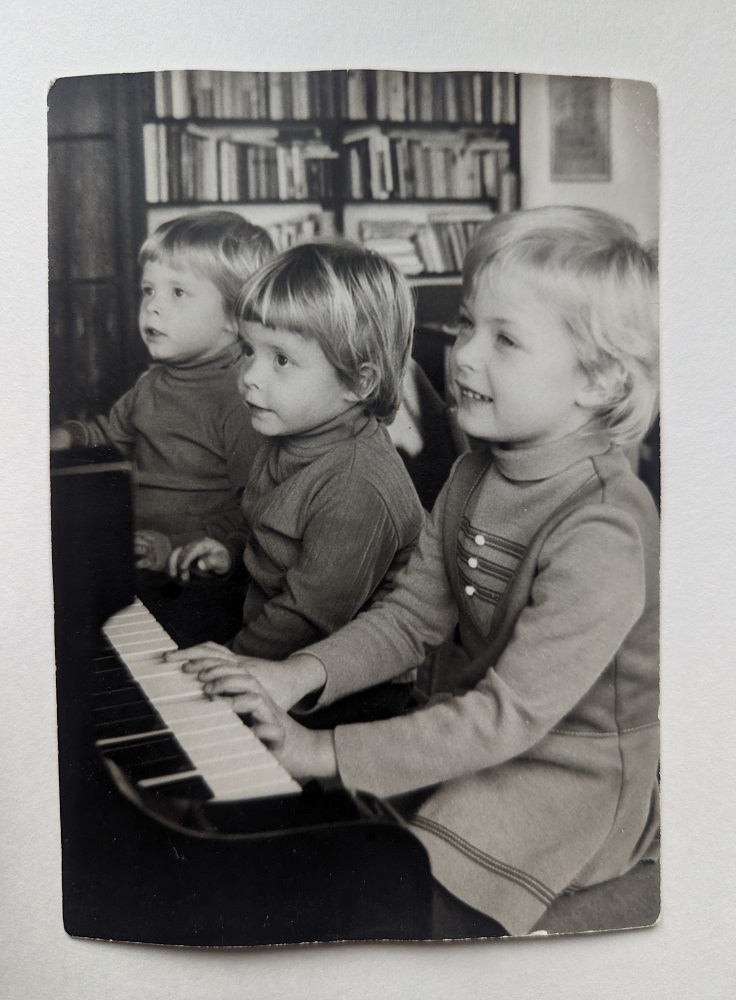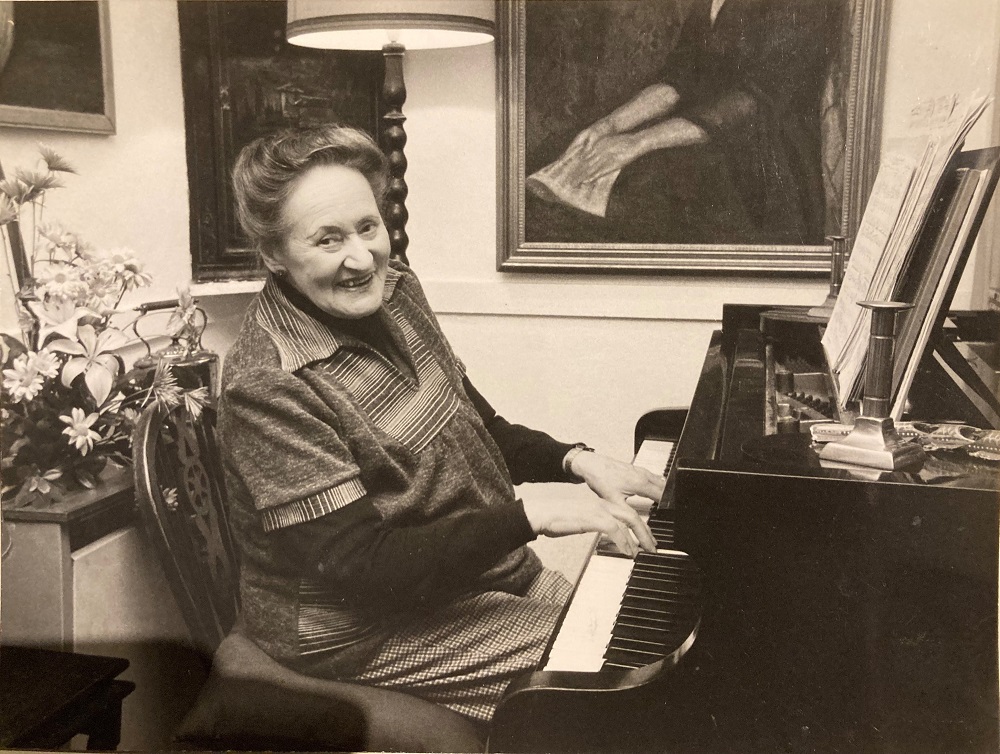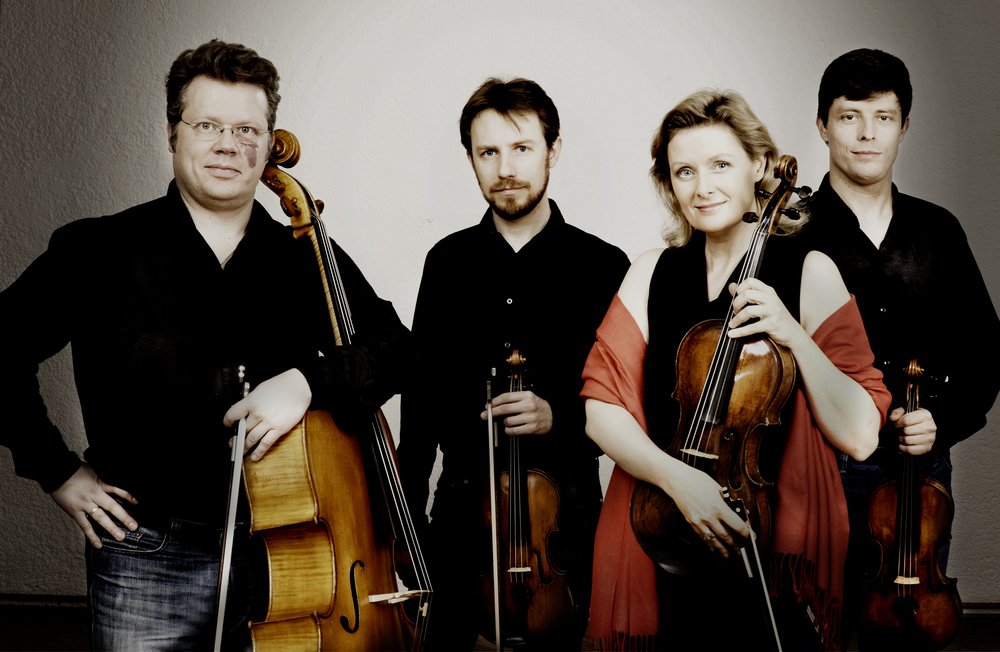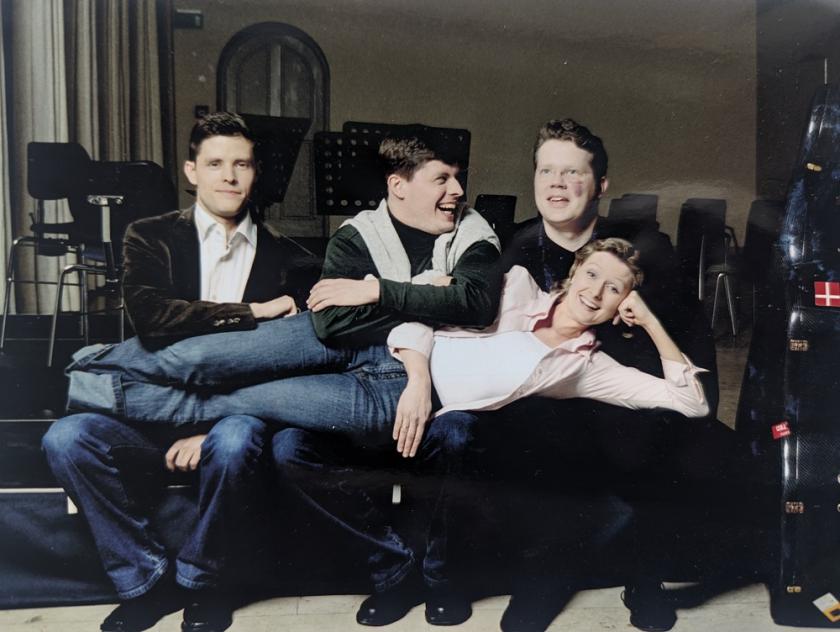We vividly remember the image of Martin Lovett, the cellist of the legendary Amadeus Quartet, bursting out laughing. He tells his favourite true travel story.
After boarding a plane, the Amadeus Quartet has taken its seats and Martin is just about to strap his cello into the seat next to him when a fellow traveller approaches him. Oh no, marvels the inquisitive man, there's a whole string quartet on board. "How many are there in a string quartet?" comes the sudden question. Martin answers spontaneously and with deep conviction: "Five!".
What a marvellous story, one we still like to tell ourselves today, always as if it were completely new to us all. The stories we know and love are the most entertaining anyway. They catapult us to the best moments in an instant.
It is actually rather obvious that there are often up to eight people in a "marriage of four". In a sense, you always marry the partners of your fellow string quartet players. Without them supporting the ensemble, there would be no career as a chamber music ensemble. Above all, the full-time string quartet demands too much of its members as a way of life. Only if you manage to maintain this symbiotic relationship for ten, or better still, for 15 years – that is, if you dedicate yourself fully and completely to the ensemble and its development for more than a decade – will the unique and unmistakable body of sound, the whole that’s greater than the sum of its parts, emerge at some point. Anyone who has experienced such a form of musical creation, which is superior to their own individual consciousness, will never it let go. Never again.
 The sun is dancing merrily on the table around which we are sitting to answer a few questions about our 30th anniversary [pictured right, young Monika with twins Christoph and Markus at the piano in 1972]. "That's the effect, but not the cause, of dedicating ourselves to the string quartet," our Primarius aptly interjects. Right, we agree. But what is the cause then? And is there such a thing as a recipe for success?
The sun is dancing merrily on the table around which we are sitting to answer a few questions about our 30th anniversary [pictured right, young Monika with twins Christoph and Markus at the piano in 1972]. "That's the effect, but not the cause, of dedicating ourselves to the string quartet," our Primarius aptly interjects. Right, we agree. But what is the cause then? And is there such a thing as a recipe for success?
We talk about the special moments of our travels together over the last 30 years, and hear ourselves talk about the clear air and breathtaking views that made us forget everything when we climbed the mountains of Petra in Jordan on a day off, or how funny the babble of languages was at the American Academy in Rome, where the Italian cheerfulness was as infectious as the passion to savour the day with music and conversation until the last minute.
But shouldn't we actually be clarifying what our recipe for success is instead of reminiscing? There are nods of agreement and concentrated expressions. "We've always focused more on the music than on ourselves and have never stopped searching. We couldn't help it," is the first suggestion from the bass section. Immediately comes the dry reply from the second violin: "Well, if you don't have any concerts, then it doesn't help to lose yourself completely in the music. Without the competition prizes, the important debuts and regular appearances at major stages from Tokyo to London to New York, without highlights such as the concerts at the Spanish court or musical challenges such as Beethoven to Trojahn cycles, things would have been very different for us."
Our silence afterwards is as eloquent as the conversations we have when we know each other's thoughts. Of course our path would have been different, but we would still have followed it. Perhaps the work would have been less international, a little quieter and more regional. Who knows? Nowadays, we call a regional presence sustainable and report on it with pride. Back then, 30 years ago, we thought that a full-time string quartet could only succeed at an international level. No distance was too far for us, no journey too arduous. Curious and hungry for new encounters and horizons, we spent much more time travelling than we did at home with our families.
We have to postpone the conversation because our train is leaving shortly. In just three hours, we’re expected in Coburg for a rehearsal. There we will see many long-time companions again, friends we are very much looking forward to meeting.
The programme once again features Bartók, as the Musikfreunde Coburg have embedded the six Bartók quartets in six exciting programmes. Even today, our interpretations of Bartók and Schoenberg are characterised by the extraordinary encounters we had as a very young ensemble at the Tanglewood Festival in the United States. We received coaching there from Louis Krasner, who gave the first performance of Alban Berg's Violin Concerto, and from Eugene Lehner of the Kolisch Quartet, the ensemble that had rehearsed quartet works by Bartók, Berg, Schoenberg and Webern with the composers themselves before they gave the premieres. We learnt at first hand how the great composers and musical visionaries had imagined their own works.
We were particularly impressed by the work they did with us on Bartók's Fifth String Quartet, a composition full of power, indeed sometimes almost brute force, as we as a young ensemble thought we detected in the musical text. But we were proved wrong. Again and again, the two musical legends asked us, for example, to clearly phrase a series of hard rhythmic beats from ff to fff, and also to play more in the upper half of the bow in order to achieve a softer yet precise sound – just as Bartók had once demanded of the Kolisch Quartet. When we play Bartók today or teach students, it is above all this great contrast between the modern understanding of extreme dynamics and our knowledge of the demands for the finest nuances made by the composer himself that we highlight and demand.  Our thoughts are centred on the English composer Freda Swain (1902-1985, pictured above), whose oeuvre is currently being rediscovered. What a genius she was. We are very much looking forward to recording her fantastic String Quartet No.1, "Norfolk" and the piano quartet The Sea on CD. We will be playing a number of premieres and international premieres by Freda Swain this year. The world premiere of "Norfolk" will take place at the Aldeburgh Festival on 11 June. We can tell from the many mistakes contained in the original manuscripts of both works that they have never been performed before; if they had, then the players would have made corrections in the parts. How much we miss information from her on questions of interpretation. Imagine if she had had friends and musicians around her who would have supported her. She would undoubtedly be internationally recognised today as one of the most prominent composers of her time. At some point in her life, there must have been a point where she withdrew more and more and avoided contact with those around her, with the result that we see today: Her amazing oeuvre packed away in boxes and forgotten. It is time to bring them back.
Our thoughts are centred on the English composer Freda Swain (1902-1985, pictured above), whose oeuvre is currently being rediscovered. What a genius she was. We are very much looking forward to recording her fantastic String Quartet No.1, "Norfolk" and the piano quartet The Sea on CD. We will be playing a number of premieres and international premieres by Freda Swain this year. The world premiere of "Norfolk" will take place at the Aldeburgh Festival on 11 June. We can tell from the many mistakes contained in the original manuscripts of both works that they have never been performed before; if they had, then the players would have made corrections in the parts. How much we miss information from her on questions of interpretation. Imagine if she had had friends and musicians around her who would have supported her. She would undoubtedly be internationally recognised today as one of the most prominent composers of her time. At some point in her life, there must have been a point where she withdrew more and more and avoided contact with those around her, with the result that we see today: Her amazing oeuvre packed away in boxes and forgotten. It is time to bring them back.
The reunion with our friends in Coburg is a real celebration. We have a lot to talk about and can hardly tear ourselves away, but the audience is waiting and the stage lights come on. As we continue our journey the following day, a remark interrupts the morning silence, as if yesterday's dialogue was only a few minutes ago. "In any case, it's clear that we're still playing today because music clubs in Stuttgart, Seligenstadt, Leamington, East Bergholt, Nagoya, Yokohama and all those places we've come to love have invited us countless times, because they've faithfully accompanied us on our artistic journey and we've become friends."
That is true. That is the recipe for success. It's the people who accompany us on this long journey. They make the difference. They were and still are at our side. Some of our agency partners are also part of this, those who are more than just agency partners. They are part of the quartet and have shaped our ensemble. So there really are many, many people in the Henschel Quartet and every single one of them is indispensable. At no time was it a decisive factor to give concerts in Carnegie Hall or the Vatican, all the stations that an artist's biography so readily lists, just like ours. We would still be the ensemble we are today if life on the "big stages" had taken place without us.
A circle of friends, the non-profit organisation "Freunde des Henschel Quartetts e.V.", formed around our quartet early on. It was the mutual inspiration and commitment that brought us all closer together over the years. We share many wonderful experiences with our friends in the circle of friends and outside the association.  Like many of our musical peers, we now curate festivals.
Like many of our musical peers, we now curate festivals.
And because the sound body as a phenomenon can only be experienced and not explained, we conjured up exactly that on the large steps of the spacious modern museum building with the first String Quartet Biennale at the Pinakothek der Moderne in Munich in 2022. Six string quartet ensembles played at six different locations in the museum, with the audience sitting loosely grouped on the steps around them. Both the ensemble and the audience were surrounded by sound and light created by video artist Manuela Hartel, who had transformed the sound phenomenon into light art: a total work of art. Munich audiences are still talking about this sound experience today. Well, it does work. What cannot be described in words can still be experienced.
While the Biennale is a joint venture of the Federal Association of Excellence Ensembles founded by Monika Henschel in 2012 and takes place in the Bavarian capital, the Henschel Quartet's two festivals breathe the peace and tranquillity of enchanting places in the countryside.
The Hicsum Festival in Denmark takes place at Herlufsholm Castle. The stately old castle buildings are set in lush, green meadows in front of the pretty village of Nestvaed, not far from the sea. After an exciting introduction, each day of the festival begins here with the audience and musicians having dinner together. The evening concert then begins.
We have been playing in Seligenstadt am Main, just half an hour from Frankfurt, for almost as long as our ensemble has been around. There, the magic of the intact medieval town centre casts a spell over you, with pretty half-timbered houses on the banks of the River Main and one of the most beautiful monastery buildings in Germany.
What else will be in our diaries: Concert tours, masterclasses, jury activities, festival management? The only certainty is that – as long as we are still playing together as a string quartet – you will find us there in the countryside with our friends, in Hicsum with a sea breeze in our hair on the way to the next concert, and in Seligenstadt playing in front of the fountain in the centre of the cloister in the balmy summer air, accompanied by the evening singing of the birds.
- The Henschel Quartet (with guest second violinist Gertrud Schilde) play Freda Swain's First String Quartet, "Norfolk" in Orford Church at 11am on Tuesday 11 June, with further performances at the Seligenstadt Festival, Germany (26 June), the Hicsum Festival, Denmark (10 July) and Yokohama, Japan (25 September)
- More classical reviews on theartsdesk














Add comment